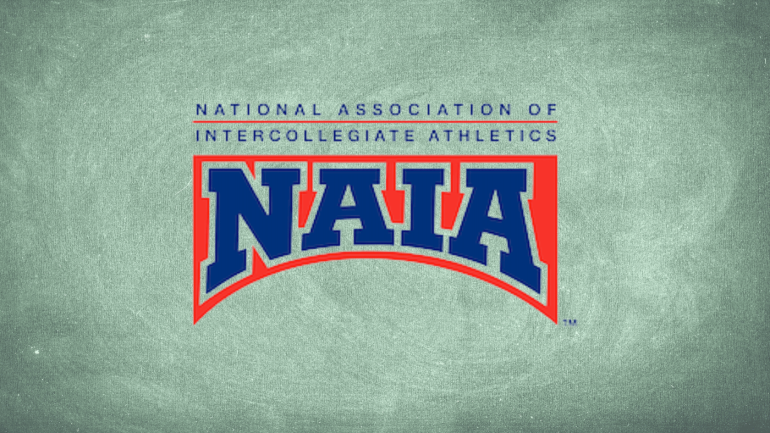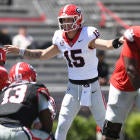
Athletes in the National Association of Intercollegiate Athletics (NAIA) will only be allowed to compete in women's sports if they were assigned the female gender at birth, the national small-college organization announced Monday.
The NAIA's Council of Presidents approved the policy in a 20-0 vote Monday morning after a December survey indicated widespread support for the move. The association's previous policy only applied to postseason competition. The new directive applies to all NAIA competitions.
The NAIA is a national athletic governing body for 249 mostly small colleges across the country that are not part of the NCAA's three divisions of competition. The membership is 80% private schools. This decision does not apply to NCAA competitions.
"We know there are a lot of different opinions out there," NAIA president Jim Carr told CBS Sports. "For us, we believed our first responsibility was to create fairness and competition in the NAIA. ... We also think it aligns with the reasons Title IX was created. You're allowed to have separate but equal opportunities for women to compete."
The NAIA is believed to be the first national college governing body to mandate that athletes compete according to assigned sex at birth.
According to Pew Research Center, 1.6% of U.S. adults are transgender or nonbinary. The NAIA has no knowledge of transgender athletes competing in its postseasons to this point, Carr said.
According to the NAIA's new policy (which is included in full below), in addition to ruling out athletes that were assigned male at birth, the policy blocks those who were assigned female but have begun masculinizing hormone therapy to transition to women.
All NAIA athletes who are no longer eligible for women's competition could still participate in men's sports, Carr said.
"It's important to know that the male sports are open to anyone," he added.
The policy doesn't apply to team activities like practices, exhibition games and scrimmages.
The move comes at a time when transgender rights are a hot topic nationally. In 2022, Penn's Lia Thomas became the only openly transgender athlete to win an NCAA Division I championship.
In 2022, the NCAA announced it would allow the national governing bodies in each sport to determine transgender policies. The new policy aligns with that of the International Olympic Committee, according to the NCAA. The association is currently in Phase 2 of a three-phase transgender participation policy.
"College sports are the premier stage for women's sports in America, and the NCAA will continue to promote Title IX, make unprecedented investments in women's sports and ensure fair competition for all student-athletes in all NCAA championships," the NCAA said in a statement provided to CBS Sports.
Sixty-eight schools' CEOs (presidents, chancellors) responded to that December survey (about 27%). Fifty-eight were in favor of the policy change, Carr said. While five councilmembers were not present to vote Monday, the 20-0 margin was more than enough for a policy that required a simple majority to pass.
"The task force spent nearly two years reviewing research, meeting with experts to better understand potential policy challenges, and obtaining feedback from multiple membership groups," said Council of Presidents chair and St. Ambrose University president Amy Novak. "With this policy, the NAIA has made its best effort to allow for the inclusion of transgender athletes in any way which does not impact the competitive fairness of women's sports. Our priority is to protect the integrity of women's athletics and allow them equal opportunity to succeed."
The complete policy, as released by NAIA on Monday:
Student-athletes may participate in NAIA competition in accordance with the following conditions:
A. Participation by students in sports designated as male by the NAIA: All eligible NAIA student-athletes may participate in NAIA-sponsored male sports.
B. Participation by students in sports designated as female by the NAIA: Only NAIA student-athletes whose biological sex is female may participate in NAIA-sponsored female sports. They may participate under the following conditions:
- A student who has not begun any masculinizing hormone therapy may participate without limitation.
- A student who has begun masculinizing hormone therapy may participate in:
a. All activities that are internal to the institution (does not include external competition), including workouts, practices, and team activities. Such participation is at the discretion of the NAIA member institution where the student is enrolled; and
b. External competition that is not a countable contest as defined by the NAIA (per NAC Policy Article XXV, Section A, Item 12). Such participation is at the discretion of the NAIA member institution where the student is enrolled.An NAIA institution that has a student-athlete who has begun masculinizing hormone therapy must notify the NAIA national office. The national office will take the necessary steps to provide appropriate privacy protections.
This policy will be subject to review in light of any legal, scientific, or medical developments.





















